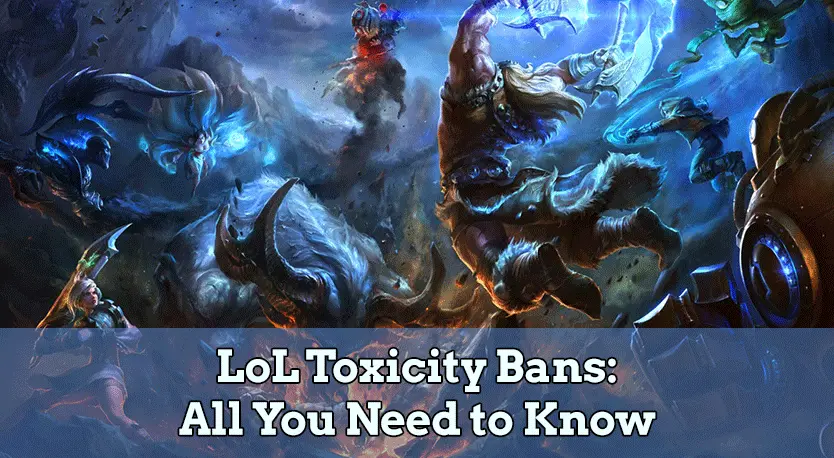Toxicity has been around in virtually every single online competitive game, since their inception, and League of Legends is no stranger to it. In fact, LoL toxicity bans are the most common and often account restrictions and suspensions issued by Riot.
Now, we all encountered a toxic player at some point while playing games and more so, this takes place in real life sports as well, as I’m sure you can recall a moment where players of opposite sports teams started a fight.
However, Riot takes flaming and toxicity in League of Legends very seriously, as they issue different types of account suspensions or restrictions based on the situation.
Of course, they sometimes make mistakes as well, either by unfairly suspending a player or missing a valid report, but all in all, LoL flaming and toxicity restrictions and suspensions happen all the time.
For all other ban reasons, check out our League suspended account masterpost!
We’re here to provide you with the best support in order to get you unbanned!
Get Unbanned!What is a League of Legends Toxicity Ban?
In a nutshell, a League of Legends toxicity account ban or suspension is a punishment for the participation in, of course, toxicity and negativity.
You might now wonder, yes but, what’s toxicity exactly? Well, I’m glad you asked! Let’s see!
The most simple way to put it is that toxicity, be it in LoL or other games, is a form of bad behavior towards other players. As in, rude or offensive.
However, there are multiple other forms of negativity that can lead to getting a League of Legends toxicity ban. For most of these bans and suspensions, you can submit a LoL ban appeal.
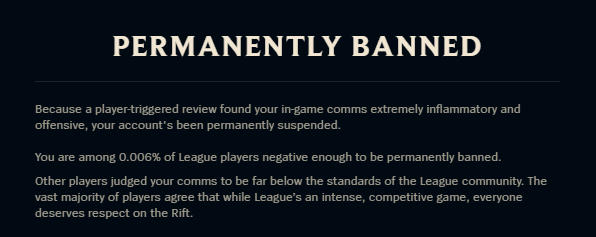
Can You Get Banned for Toxicity in LoL?
Short answer, yes. Long answer, well, yes as well. Why? Because Riot takes toxicity super seriously, as this negative behavior takes a big toll on the game and its community. Games should be fun and entertaining, and many players use them as a getaway from real life issues.
However, as you’ll see below, in some cases, you might not even be aware you’re being toxic or negative. On top of that, keep in mind that in-game, nobody knows how or why you meant to say something in particular, so even if you think you’re making a joke, it might come across as offensive or as negative.
On the other hand, saying certain statements or slurs will result in a permanent ban, so you definitely need to steer away from this type of behavior. This is also a case that’s basically impossible to get unbanned from League.
Regarding LoL toxicity bans, they come as a result of:
- toxicity and flaming;
- inting or feeding;
- griefing;
- AFKing;
- report abuse.
Toxicity and Flaming in League
Flaming in LoL is the kind of thing that you know it when you see it, in the form of rude and offensive remarks. Of course, other serious forms of flaming and toxicity include threats or name-calling, while milder forms are being annoying or complaining.
Basically, if you complain about the game or insult a different player, it’s still toxicity, although often punished differently.
Another thing about flaming in League is that virtually all chat restrictions and suspensions come as a result of player reports. So, if you are negative or say offensive things, other players will report you.

Riot reviews those reports and if they’re correct, your LoL account gets a restriction. This is the game’s Instant Feedback System.
Inting or Feeding
Inting stands for “intentionally feeding”, while feeding is allowing the enemy team to kill you over and over, and thus, gaining more experience and gold as a result. This places the enemy team at quite an advantage and usually results in a very easy win for them.
Depending on the game you play, you might know about inting as throwing, such as in Overwatch bans. It means the same thing, throwing the game, sabotaging your teammates and causing the enemy team to win.
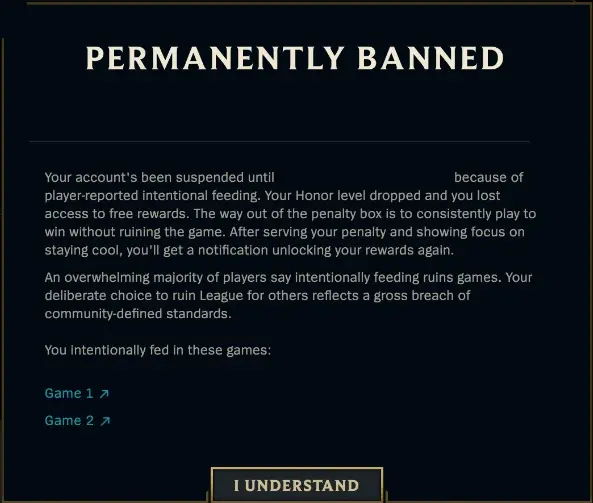
Although not all feeders are also offensive in chat, inting and feeding in League of Legends is still a form of toxicity and thus, punished accordingly.
Griefing
Griefing in LoL is yet another form of toxicity, where a player ruins the team’s experience on purpose.
This can happen in multiple ways, such as buying random items, stealing experience from teammates, changing positions or following others around, picking bad heroes or simply leaving the game altogether.
Apart from leaving the game, everything else resembles a brand new player’s gameplay. However, griefing mostly takes place in ranked matches, where a player should already know their way around the game.
AFKing in League of Legends
Yup, you guessed it! AFKing in LoL is a form of toxicity where a player causes a negative experience to their teammates by simply refusing to play the match altogether, even going away from keyboard.
However, going AFK in League or other games doesn’t always mean it’s on purpose. You can’t pause online games, we all know that, but you also can’t pause certain real life incidents. So, if the pizza guy is at the door or if your dog peed on the carpet, don’t worry about an AFK ban.
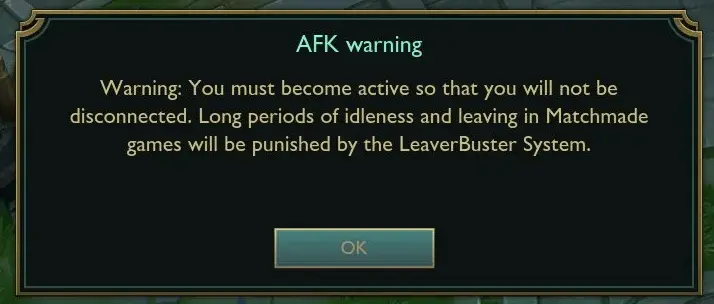
In fact, AFKing in LoL very rarely results in an account ban, as they have a completely different punishment system – queue lockouts and delays, but if you happen to AFK one game out of dozens, there’s no need to worry about it.
False Reporting and Report Abuse in LoL
Sometimes, passion or the sense of justice gets the better of us. This is something which happens in League of Legends as well, where negativity is quite a subjective thing. Certain things can sound or look negative to you personally, but not to everyone else.
In that regard, issuing a report isn’t an issue, but if you’re asking others in the game to do it as well, that’s when it becomes a problem, labeled as false reporting or report abuse.
Unfortunately, mass reporting a player for no reason sometimes triggers an automated suspension. Luckily, false report bans are overturned fairly easy upon submitting a Riot ban appeal.
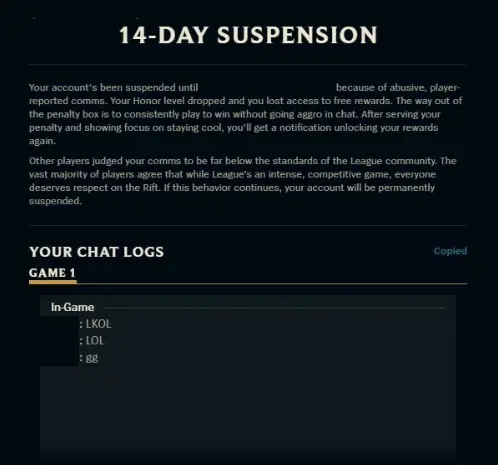
Bottom line is, you can report a player if they have insulted you, but try to refrain from asking others to do the same.
Now, based on the toxicity form, let’s see what the LoL account suspension times are!
How Long are LoL Toxicity Bans?
Based on the behavior displayed, toxicity in League of Legends will be punished as such:
- 3-day chat restriction for the very first offense;
- 7-day chat restriction for the second offense;
- 14-day account suspension for the third offense;
- permanent account ban for the forth offense.
Depending on how bad the offense in question is, a player will start with a chat restriction. This prevents using the in-game chat feature altogether, being unable to communicate with others. If the same player keeps the same poor behavior, they’ll receive a 7-day chat restriction.
The third time around, the player has their entire LoL account suspended for 2 weeks, unable to log in or play at all. If they still don’t change their behavior for good after the 2 weeks, a permanent account closure will follow.
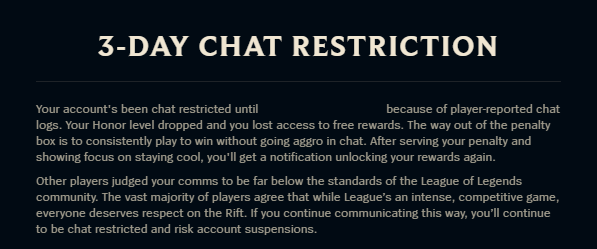
Even though the road from a 3-day chat mute to a permanent LoL account ban seems to be long enough, it isn’t. If you don’t change your behavior and don’t take the 3-day chat restriction as a big warning sign, you will eventually get permanently banned.
More so, take note that depending on the chat logs in question, a player can receive a permanent ban in LoL straight off the bat, skipping the entire punishment system. This happens in cases of extreme toxicity, threats and harassment.
On the other hand, punishments for AFKing in League are different, with queue lockouts and queue delays, on a 0 to 7 tier.
Tier 0 will have no queue lockout or delay, gradually increasing to Tier 7, which will have a 14 day queue lockout and a 15 minute queue delay for 5 games.
That said, you can lower back your AFK Tier level by continuing to play the game normally, without AFKing or leaving matches.
Avoiding a Toxicity Ban in League
It’s pretty safe to say that if you mind your own business and go about your game legitimately, you should be fine. However, as we said above, passion sometimes get the better of us, so you might end up taking things to chat. Don’t! Not much good will come out of it, and the line from there to a ban is quite thin.
It’s also no secret how competitive the game is or how frustrating some matches get. That’s why, if you feel tilted or upset after a match, make sure to take a break, get some fresh air, watch some funny content, and don’t queue back right away.
Regarding other toxic players, the best way to deal with them is to report and mute them. Don’t try to fight back or defend yourself or other players, as nothing good comes from it. Chances are, there’s nothing you can say to change another player’s mind about griefing or inting that match, so you should just focus on doing your best.
Another important thing is to always be on your best behavior when playing LoL. If you’re already angry or upset with a different matter, maybe it’s not a good time to queue, so see if there’s anything more relaxing to do meanwhile.
Lastly, if you don’t trust yourself not to fight back or vent, the best thing to do is mute the chat altogether, by using the “/mute all” command. This way, you won’t see anything that annoys you.
To sum it up:
- take frequent breaks and don’t chain-queue games;
- report and mute toxic players, don’t fight back;
- be on your best behavior when playing;
- mute the entire chat if tilted.
The Tyler1 Unban Dilemma
To this day, a lot of players believe that famous LoL streamer Tyler1 had his ban lifted, allowing him to return to the game. That’s both true and false.
You see, unlike 99% of the League of Legends toxicity bans, Tyler1 was actually ID banned, not account banned. That means that there was a ban in place for him as a person, forbidding him to even start a brand new account and play there instead.
That’s completely different from most other bans, where the ban is on the account itself, allowing the player to start a brand new one.
In that regard, Tyler1 had only his ID ban removed, as in, allowing him to start a fresh new account and play there. All of his old accounts are still banned.
Conclusion
Hopefully now you have a much better understanding at what League of Legends toxicity bans are, as well as how to avoid them.
That said, if you need help appealing a League ban, we’re here for you!
We’re here to give you the best help in order to recover your account!
Get Unbanned!
